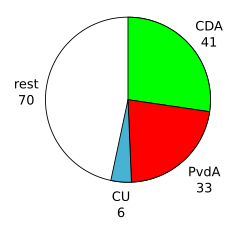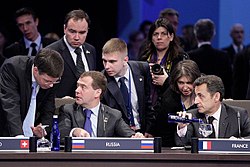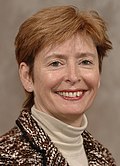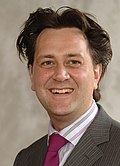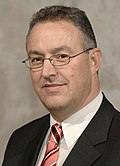The Labour Party is a social-democratic political party in the Netherlands.

Jan Pieter "Jan Peter" Balkenende Jr. is a Dutch politician of the Christian Democratic Appeal (CDA) party and jurist who served as Prime Minister of the Netherlands from 22 July 2002 to 14 October 2010.

The Christian Democratic Appeal is a Christian-democratic political party in the Netherlands. It was originally formed in 1977 from a confederation of the Catholic People's Party, the Anti-Revolutionary Party and the Christian Historical Union; it has participated in all but three cabinets since it became a unitary party.
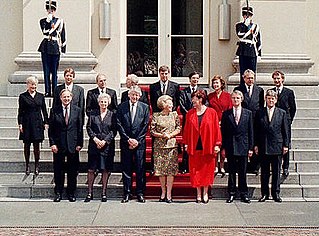
The second Kok cabinet, also called the second Purple cabinet was the executive branch of the Dutch government from 3 August 1998 until 22 July 2002. The cabinet was a continuation of the previous first Kok cabinet and was formed by the social-democratic Labour Party (PvdA), the conservative-liberal People's Party for Freedom and Democracy (VVD) and the social-liberal Democrats 66 after the election of 1998. The cabinet was a centrist grand coalition and had a substantial majority in the House of Representatives with Labour Leader Wim Kok serving as Prime Minister. Prominent Liberal politician Annemarie Jorritsma the Minister of Transport and Water Management in the previous cabinet served as Deputy Prime Minister and Minister of Economic Affairs, former Progressive-Liberal Leader Els Borst continued as Minister of Health, Welfare and Sport and served as Deputy Prime Minister.

The second Balkenende cabinet was the executive branch of the Government of the Netherlands from 27 May 2003 until 7 July 2006. The cabinet was formed by the Christian-democratic Christian Democratic Appeal (CDA), the conservative-liberal People's Party for Freedom and Democracy (VVD), and the social-liberal Democrats 66 (D66) after the election of 2003. The cabinet was a centre-right coalition and had a slim majority in the House of Representatives with Christian Democratic Leader Jan Peter Balkenende serving as Prime Minister. Liberal Leader Gerrit Zalm, a former Minister of Finance, served as Deputy Prime Minister and returned as Minister of Finance, while former Progressive-Liberal Leader Thom de Graaf served as Deputy Prime Minister and Minister without Portfolio for the Interior.

Wouter Jacob Bos (Dutch pronunciation: [ˈʋʌutər ˈbɔs]; is a retired Dutch politician of the Labour Party and businessman.

General elections were held in the Netherlands on 22 January 2003.

André Rouvoet is a retired Dutch politician of the Reformatory Political Federation (RPF) party and later the Christian Union (CU) party and jurist. He is the chairman of the executive board of the Healthcare Insurance association (ZN) since 1 February 2012.

General elections were held in the Netherlands on 22 November 2006, following the fall of the Second Balkenende cabinet. The election proved relatively successful for the governing Christian Democratic Appeal (CDA) which remained the largest party with 41 seats, a loss of only three seats. The largest increase in seats was for the Socialist Party (SP), which went from nine to 25 seats. The main opposition party, the social democratic Labour Party (PvdA) lost nine of its 42 seats, while the right-liberal People's Party for Freedom and Democracy (VVD) and the progressive liberal Democrats 66 lost a considerable portion of their seats, six of 28 and three of six, respectively. New parties, such as the right-wing Party for Freedom (PVV) of former VVD MP Geert Wilders and the animal rights party Party for the Animals (PvdD) were also successful, with the PVV winning nine seats and the PvdD winning two, thereby becoming the first animal rights group to enter a European parliament.

The First Lubbers cabinet was the executive branch of the Dutch Government from 4 November 1982 until 14 July 1986. The cabinet was formed by the christian-democratic Christian Democratic Appeal (CDA) and the conservative-liberal People's Party for Freedom and Democracy (VVD) after the election of 1982. The cabinet was a right-wing coalition and had a substantial majority in the House of Representatives with Christian Democratic Leader Ruud Lubbers serving as Prime Minister. Prominent Liberal politician Gijs van Aardenne, a former Minister of Economic Affairs, served as Deputy Prime Minister and returned Minister of Economic Affairs.

The Second Van Agt cabinet was the executive branch of the Dutch Government from 11 September 1981 until 29 May 1982. The cabinet was formed by the christian-democratic Christian Democratic Appeal (CDA), the social-democratic Labour Party (PvdA) and the social-liberal Democrats 66 (D'66) after the election of 1981. The cabinet was a Centre-left grand coalition and had a substantial majority in the House of Representatives with Christian-Democratic Leader Dries van Agt serving as Prime Minister. Former Labour Prime Minister Joop den Uyl the Labour Leader served as Deputy Prime Minister, Minister of Social Affairs and Employment and was given the portfolio of Netherlands Antilles Affars, Progressive-Liberal Leader Jan Terlouw served as Deputy Prime Minister and Minister of Economic Affairs.

The First Van Agt cabinet, also called the Van Agt–Wiegel cabinet was the executive branch of the Dutch Government from 19 December 1977 until 11 September 1981. The cabinet was formed by the christian-democratic Christian Democratic Appeal (CDA) and the conservative-liberal People's Party for Freedom and Democracy (VVD) after the election of 1977. The cabinet was a centre-right coalition and had a slim majority in the House of Representatives with Christian Democratic Leader Dries van Agt serving as Prime Minister. Liberal Leader Hans Wiegel served as Deputy Prime Minister and Minister of the Interior.
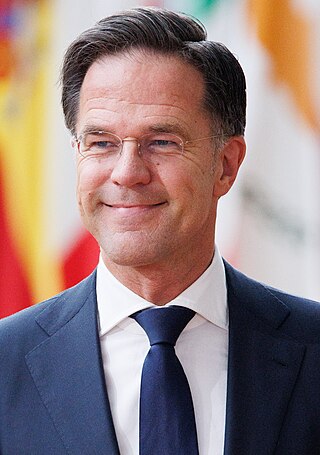
Mark Rutte is a Dutch politician who has served as prime minister of the Netherlands since 2010. He was also the leader of the People's Party for Freedom and Democracy (VVD) from 2006 through 2023. He is currently acting in a demissionary capacity, and will not return to politics following the installation of a new cabinet.

The third Balkenende cabinet was the executive branch of the Government of the Netherlands from 7 July 2006 until 22 February 2007. The cabinet was formed by the Christian-democratic Christian Democratic Appeal (CDA) and the conservative-liberal People's Party for Freedom and Democracy (VVD) after the fall of the second Balkenende cabinet. The caretaker rump cabinet was a centre-right coalition and had a minority in the House of Representatives with Christian Democratic Leader Jan Peter Balkenende serving as Prime Minister. Former Liberal Leader Gerrit Zalm continued as Deputy Prime Minister and Minister of Finance.

Following the 2006 Dutch general election, held on November 22, a process of cabinet formation started, involving negotiations about which coalition partners to form a common programme of policy and to divide the posts in cabinet. On February 22, 2007 it resulted in the formation of the Fourth Balkenende cabinet.

The 2003 Dutch cabinet formation concerned the formation of a new cabinet after the 2003 Dutch general election held on January 22, 2003. It involved negotiations about which coalition partners would form a common programme of policy and it involved the division of the cabinet posts. After severe disagreements in the formation of a CDA-PvdA cabinet, a CDA-VVD-D66 cabinet was formed on May 27, 2003, with Balkenende as prime minister.

General elections were held in the Netherlands on Wednesday 9 June 2010. This was triggered by the fall of Prime Minister Jan Peter Balkenende's fourth cabinet on 20 February with Queen Beatrix accepting the resignation of the Labour Party (PvdA) ministers on 23 February. The conservative-liberal People's Party for Freedom and Democracy (VVD), led by Mark Rutte, won the largest number of seats in the House of Representatives while the social-democratic PvdA, led by Job Cohen, came a narrow second. The election was also noted for the rise of the Party for Freedom (PVV), which came third, led by controversial politician Geert Wilders. On the other hand, Balkenende's Christian Democratic Appeal (CDA) saw a poor result, losing half its seats and dropping from first to fourth place. The Socialist Party (SP) also lost seats. Notably, the 31 seats won by the VVD was its most since 1998, and the one-seat margin between the VVD and PvdA is the closest on record.

The first Rutte cabinet, also called the Rutte–Verhagen cabinet was the executive branch of the Government of the Netherlands from 14 October 2010 until 5 November 2012. The cabinet was formed by the conservative-liberal People's Party for Freedom and Democracy (VVD) and the Christian-democratic Christian Democratic Appeal (CDA) after the election of 2010. The cabinet was a right-wing coalition and had a minority in the House of Representatives but had confidence and supply from the Party for Freedom (PVV) for a slim majority with Liberal Leader Mark Rutte serving as Prime Minister. Christian Democratic Leader Maxime Verhagen served as Deputy Prime Minister and Minister of Economic Affairs, Agriculture and Innovation.

Early general elections were held in the Netherlands on 12 September 2012 after Prime Minister Mark Rutte handed in his government's resignation to Queen Beatrix on 23 April. The 150 seats of the House of Representatives of the Netherlands were contested using party-list proportional representation. The People's Party for Freedom and Democracy (VVD) received a plurality of the votes, followed by the Labour Party (PvdA).

